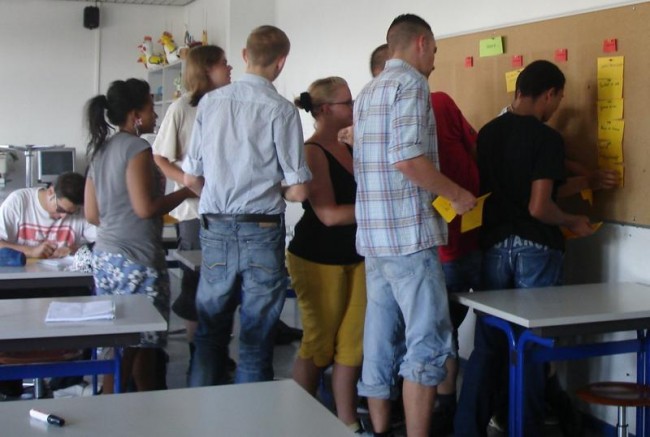In 2004 I started as a teacher of English and Fine Art at a special school in Aachen, Germany. Our school is a night-school where lessons are from 5 to 9.50 p.m and our students are mostly young adults. The youngest admitted are 17 years old, the oldest I ever taught were a Russian couple of about 60 years, but the average student is between 18 and 35 years old. So we do have quite a large span of ages in our semesters. Besides that our students come from more than 50 countries. They attend our school to accomplish their junior high school graduation which they had not been able to do before – for various reasons. Some come from war zones, others have a history of family problems and some fought or fight with addictions.
I often feel touched and very compassionate towards them as they are trying to fight their demons and at the same time are striving for graduation and a better future. As I have a bit of psychological training I see many of them and wish to support them so very much, especially as some are married and already have children of their own and many will start their own little families not too long from now. So a healthy, safe and sane basis for the next generation would be a wonderful thing to achieve.
But my role as a teacher is not a psychological one and they should never get mixed up. So I designed a support programme with external psychologists, but failed sadly in getting the educational authorities, who highly praised the idea, to take over financial responsibility (which would have been rather small as the 2 psychologists who wanted to join in, asked for very little money). After trying for almost three years I was frustrated and on the verge of giving up.
Then in January 2007 I saw a brief TV report on Ian Morris teaching ‘A Course in Well Being’ at Wellington College and I became very excited. There it was, the solution. Why should I wait for others if there was a chance to act myself.
I contacted Ian Morris and he was so very kind to send me all his papers for a whole years course for free to use at our school. In February 2008, after rearranging and amending it for our students and the German situation and getting permission from our headmasters and the regional educational authorities, I started with the first semester on a one year’s course of ‘BEING happy – how does that work ?’ Well, I know Ian Morris does not talk about ‘teaching happiness’ because he says, ‘this one cannot learn’. But, being buddhist, I have learned the positive effects of the attentiveness of the moment and that this can indeed be furthered and that there are plenty of ways to learn and consequently to also teach this.
So I decided to put the emphasis on the ‘BEING’ happy and the little tips and tricks that one can learn to support a flourishing life. Up until now I have received feedback on 5 semesters (about 75 students all together) that they love it. They tell me things like; ‘ I didn’t believe in it in the beginning, but what you taught us, really works.’ And my fellow teachers tell me that those students are friendlier, calmer and more interested in their lessons. Additionally the statistics support us. We have a high number of drop-outs in other semesters, sometimes up to 50 % of those who have started a year, but the semesters on ‘BEING happy’ stay rather constant (less than 15 % drop out) and also show better results with even more quality certificates than ever before (maybe a coincidence).
So what did and what do we do?
In summer 2007 our then headmaster Mr Niespor applied to the educational administration for a test run. So my fellow teacher E. Reisen, a philosopher, and I started team teaching ‘BEING Happy- how does that work?’ with a half year course in February 2008. In August 2008 we extended it to a whole year’s course based on the experience of the first half year. Since then we either teach in team teaching or at the moment in parallel courses. I, in my officially called art lessons (the art of living?) and Erich in his philosophy lessons.

Each single lesson starts with three breathing exercises from Yoga and a brief period of meditation (5 – 10 min., which I rather call ‘sitting in silence’ than meditation as we have a lot of Muslim students and this is not on religion). This is followed by a round of ‘What happened during the last few days or weeks that gave me a good feeling? Or ‘where I succeeded.’ And the lesson ends with wishing myself and all the others a beneficial time. This rather ritualised start and end of each lesson seems to be quite supportive for the students, most of them like it a lot. In between we work on different topics with many different methods, most of them based on experience-oriented tasks as I very much believe in a learning with body and mind .
During the first half year called ‘I – I – I ’ we keep looking at the individual student and what each of them can do to support their individual well being, good food, enough water/liquids, enough light, sleep, sports etc. Also advising the students about how to find their own positive resources (using an NLP exercise), how to find a stable stand (in body and mind), where to find their place in a triangle of ‘love, insight and order’ (an exercise from constellation work) etc.

The second half of the year is called ‘ I – You – We ’ and looks at relations with others and how we can have loving relations with others and a responsible relationship with the world. Amongst the topics here are the theme centered interaction according to Ruth Cohn, non violent communications (Marshall B. Rosenberg), the bio chemistry of love and our responsibility in our community and for a healthy environment.
In Germany we are the only school running a programme like this for a whole year. At very few other schools, pupils are taught equivalent aspects for a period of about 6 – 8 weeks.
To be quite honest not every fellow teacher at our school likes us doing this, they argue that more maths or languages would be better; not every student likes it, they say ‘it’s too esoteric’ (these are the few who usually do not even come to the lessons), but the general reaction is very positive and supportive and we have the full support of our head masters.
Lately those joining the classes, that can last a semester, ask to be taught “BEING happy”. One of the classes has only half a year left until graduation so I developped an accelerated course for them.
And just last week I spent a wonderful time with two groups at a local whole food store who offered a food-tasting session for the students, a wonderful chance to talk about responsible agriculture and stockbreeding. I also cooperate with a Yoga teacher who comes to the classes and fellow teachers who contribute with the knowledge from their fields Also with local sponsors for meditation cushions and sports utilities, if needed.
So what happens is very important for our students, they are seen by society and they also realise that there are people caring.
As I mentioned before, there is no official subject called ‘BEING Happy’ we offer those lessons in what on our timetable is called art and/or philosophy and the verifiable outcome of better marks, more sober and responsible behaviour and more stable numbers of students shows that we are on a good path. I have another three years at this school, so I will be able to support another maybe 80 – 100 students, but I hope very much to be able to hand this over to other teachers so it spreads for the benevolence of students and teachers.


Leave a Reply